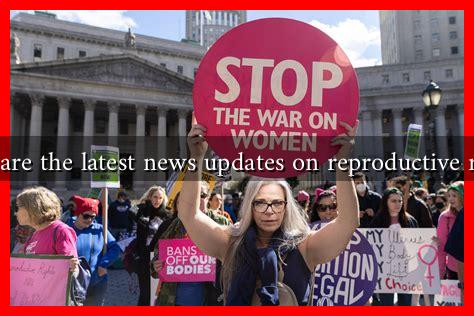-
Table of Contents
What are the Latest News Updates on Reproductive Rights?
Reproductive rights have become a focal point of political and social discourse in recent years, especially following significant legal changes and societal shifts. As of late 2023, various developments across the globe have sparked renewed debates and actions surrounding reproductive health, access to abortion, and women’s rights. This article aims to provide an overview of the latest updates in reproductive rights, highlighting key events, legislative changes, and ongoing challenges.
Recent Legislative Changes in the United States
In the United States, the landscape of reproductive rights has been dramatically altered since the Supreme Court’s decision to overturn Roe v. Wade in June 2022. This ruling allowed individual states to set their own abortion laws, leading to a patchwork of regulations across the country. As of now, several states have enacted restrictive laws, while others have moved to protect access to abortion services.
- States with Restrictive Laws: States like Texas, Alabama, and Florida have implemented stringent abortion bans, often with limited exceptions. For instance, Texas’s Senate Bill 8 allows private citizens to sue anyone who performs or aids an abortion after six weeks of pregnancy.
- States Protecting Access: Conversely, states such as California and New York have taken steps to safeguard reproductive rights. California has expanded access to abortion services and has allocated funds to support women traveling from states with restrictive laws.
According to a report by the Guttmacher Institute, as of 2023, over 20 states have enacted laws that significantly restrict access to abortion, while at least 10 states have moved to protect or expand access. This division has led to increased travel for women seeking abortions, with many heading to states where the procedure remains legal.
International Developments in Reproductive Rights
Globally, reproductive rights are also in flux, with various countries making headlines for their policies and reforms.
- Argentina: In December 2020, Argentina became the first major Latin American country to legalize abortion, a landmark decision that has inspired movements across the region. As of 2023, the implementation of this law has been closely monitored, with reports indicating a significant increase in safe abortions and a decrease in maternal mortality rates.
- Poland: In contrast, Poland has seen a tightening of abortion laws, with a near-total ban in place since 2021. This has led to widespread protests and calls for reform, highlighting the ongoing struggle for reproductive rights in Eastern Europe.
According to the World Health Organization, unsafe abortions remain a leading cause of maternal mortality worldwide, underscoring the importance of access to safe and legal reproductive health services.
Public Opinion and Activism
The public’s perception of reproductive rights is evolving, with increasing activism and advocacy efforts aimed at protecting and expanding access. Recent surveys indicate that a majority of Americans support the right to choose, with many advocating for legislative changes to safeguard reproductive health.
- Grassroots Movements: Organizations such as Planned Parenthood and the Center for Reproductive Rights have ramped up their efforts to mobilize supporters and provide resources for those affected by restrictive laws.
- Legal Challenges: Numerous legal battles are underway, with advocacy groups challenging restrictive laws in court. For example, a recent case in Idaho is being closely watched as it could set a precedent for other states with similar laws.
Activism has also taken on new forms, with social media campaigns raising awareness and fostering community support. The hashtag #BansOffOurBodies has gained traction, uniting individuals across the country in the fight for reproductive rights.
Conclusion: The Ongoing Fight for Reproductive Rights
The landscape of reproductive rights is continually evolving, marked by significant legal changes, public opinion shifts, and grassroots activism. As we move forward, it is crucial to remain informed about these developments and support efforts aimed at protecting and expanding access to reproductive health services. The fight for reproductive rights is far from over, and the outcomes of ongoing legal battles and legislative changes will have lasting implications for women and families across the globe.
For more information on reproductive rights and ongoing advocacy efforts, visit Planned Parenthood and Guttmacher Institute.

